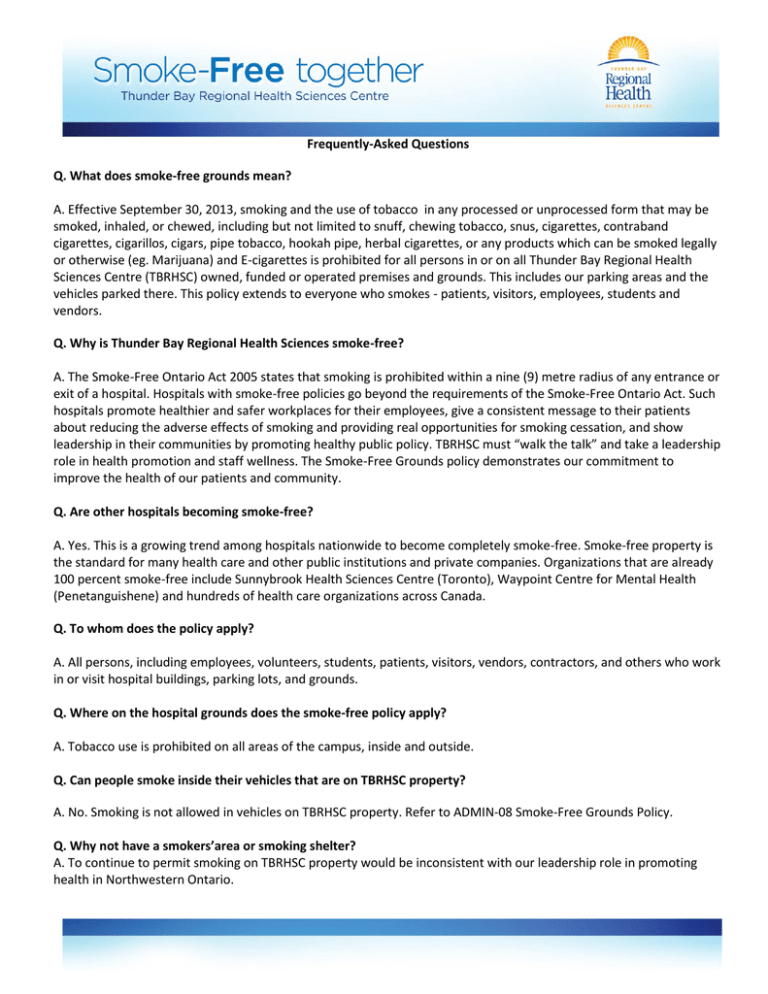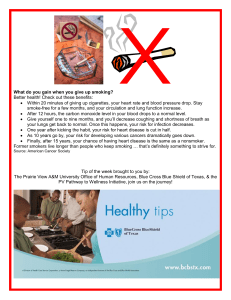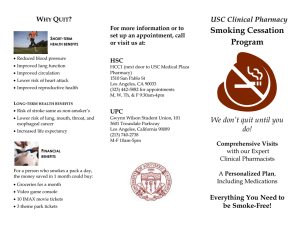FAQ`s - Thunder Bay Regional Health Sciences Centre
advertisement

Frequently-Asked Questions Q. What does smoke-free grounds mean? A. Effective September 30, 2013, smoking and the use of tobacco in any processed or unprocessed form that may be smoked, inhaled, or chewed, including but not limited to snuff, chewing tobacco, snus, cigarettes, contraband cigarettes, cigarillos, cigars, pipe tobacco, hookah pipe, herbal cigarettes, or any products which can be smoked legally or otherwise (eg. Marijuana) and E-cigarettes is prohibited for all persons in or on all Thunder Bay Regional Health Sciences Centre (TBRHSC) owned, funded or operated premises and grounds. This includes our parking areas and the vehicles parked there. This policy extends to everyone who smokes - patients, visitors, employees, students and vendors. Q. Why is Thunder Bay Regional Health Sciences smoke-free? A. The Smoke-Free Ontario Act 2005 states that smoking is prohibited within a nine (9) metre radius of any entrance or exit of a hospital. Hospitals with smoke-free policies go beyond the requirements of the Smoke-Free Ontario Act. Such hospitals promote healthier and safer workplaces for their employees, give a consistent message to their patients about reducing the adverse effects of smoking and providing real opportunities for smoking cessation, and show leadership in their communities by promoting healthy public policy. TBRHSC must “walk the talk” and take a leadership role in health promotion and staff wellness. The Smoke-Free Grounds policy demonstrates our commitment to improve the health of our patients and community. Q. Are other hospitals becoming smoke-free? A. Yes. This is a growing trend among hospitals nationwide to become completely smoke-free. Smoke-free property is the standard for many health care and other public institutions and private companies. Organizations that are already 100 percent smoke-free include Sunnybrook Health Sciences Centre (Toronto), Waypoint Centre for Mental Health (Penetanguishene) and hundreds of health care organizations across Canada. Q. To whom does the policy apply? A. All persons, including employees, volunteers, students, patients, visitors, vendors, contractors, and others who work in or visit hospital buildings, parking lots, and grounds. Q. Where on the hospital grounds does the smoke-free policy apply? A. Tobacco use is prohibited on all areas of the campus, inside and outside. Q. Can people smoke inside their vehicles that are on TBRHSC property? A. No. Smoking is not allowed in vehicles on TBRHSC property. Refer to ADMIN-08 Smoke-Free Grounds Policy. Q. Why not have a smokers’area or smoking shelter? A. To continue to permit smoking on TBRHSC property would be inconsistent with our leadership role in promoting health in Northwestern Ontario. 2 During engagement sessions, TBRHSC Staff, Board of Directors members and smoking and non-smoking members of the community recommended TBRHSC demonstrate leadership in health promotion and not provide smoking shelters. Smoking bans have been shown to have many health benefits: they decrease tobacco consumption, reduce healthrelated hospital admissions, increase quit attempts, boost quit rates, and lengthen the time between relapse. Tobacco use in and around the hospital poses major health and safety risks. There is no safe level of exposure to tobacco smoke. This is about creating a smoke-free environment that promotes health and wellness, supports efforts to quit, and protects people from second-hand smoke. It’s one more way we can actively help our patients manage complex health conditions. Q. What kind of support is being offered to employees? A. Assistance for staff and medical staff consists of: Coverage of prescribed Nicotine Replacement Therapy (NRT), medications, and counseling as per the guidelines and maximums set out in the Hospital extended health services benefit plan; TBRHSC offers a $400/lifetime benefit for Full-Time and Part-Time staff for smoking cessation. Smoker’s Helpline – Connect to Quit Free, personalized advice, counseling and a quit plan that suits you. Telephone, online, and text options available. Call 1.877.513.5333 or go to www.smokershelpline.ca Thunder Bay District Health Unit Take Control: Personal Tobacco-Free Counseling Web: www.tbdhu.com Free, individual cessation counseling (NRT voucher system available for eligible clients) Call Carrie – Tobacco Treatment Specialist – at 807.625.5982 The Quit Coach Individual Cessation Counseling Fee for Service Contact Jim Morris at 472.6309 or email jtmorris@tbaytel.net Thunder Bay Medical Centre – 63 N. Algoma Street Pharmacists Community pharmacists are is also part of the integrated healthcare team available to provide valuable support for quitting smoking. Ask him or her about your smoking cessation needs (see attached list of pharmacists trained in smoking cessation. TBRHSC will internally promote STOP on the Road sessions being offered in Thunder Bay and throughout Northwestern Ontario. 3 Q. What support is being provided to inpatients who smoke? A. Every patient upon admission will be asked about his or her smoking status. This will be documented on the admission database. For those individuals who are interested, Nicotine Replacement Therapy will be provided during their hospital stay through a medical directive. The smoking cessation nurse will also meet with patients who are interested for intensive cessation counseling at bedside as well as follow up telephone calls upon discharge. Q. What kind of support is being offered to visitors while on hospital grounds? A. Visitors who wish to use tobacco must leave the hospital grounds in order to do so. Community resources are available: Smoker’s Helpline – Connect to Quit Free, personalized advice, counseling and a quit plan that suits you. Telephone, online, and text options available. Call 1.877.513.5333 or go to www.smokershelpline.ca Thunder Bay District Health Unit Take Control: Personal Tobacco-Free Counseling Web: www.tbdhu.com Free, individual cessation counseling (NRT voucher system available for eligible clients) Call Carrie – Tobacco Treatment Specialist – at 807.625.5982 The Quit Coach Individual Cessation Counseling Fee for Service Contact Jim Morris at 472.6309 or email jtmorris@tbaytel.net Thunder Bay Medical Centre – 63 N. Algoma Street Pharmacists Community pharmacists are is also part of the integrated healthcare team available to provide valuable support for quitting smoking. Ask him or her about your smoking cessation needs (see attached list of pharmacists trained in smoking cessation. TBRHSC visitors can check with their health insurance plans to determine what kind of tobacco cessation assistance is offered. Q. Isn’t smoking a personal right? A. We are not asking employees, visitors, and patients to quit using tobacco products but rather to refrain from using tobacco products while visiting or working at Thunder Bay Regional Health Sciences Centre. This initiative is consistent with our goals of supporting good health and wellness. 4 Q. How will patients, visitors and others learn of TBRHSC’s strengthened commitment to the smoke-free policy? A. We will announce our strengthened commitment to the policy through the media and post signs on the property. We will provide information to staff, physicians and other health care providers via the Intranet and iNformed newsletter and inserts attached to paystubs. We ask that managers begin discussing this policy with employees as soon as possible so all of us can prepare for this change. Upon admission, the relevant aspects of the Smoke-Free Grounds policy will be reviewed with all patients and their families, or with those individuals accompanying a patient by admitting staff. Admitting staff will inquire whether the patient uses tobacco products and note the answer in the patient’s health record in the admissions database. All health care staff who have interactions with patients will ask about tobacco use at every opportunity and document client/patient tobacco use status. A statement that TBRHSC is 100% smoke-free will be included on all internal/external job postings and letters offering employment. Information about the Smoke-Free Grounds policy will also be provided to new hires during orientation/education sessions. Q. Does the policy punish smokers? A. Our policy is designed to provide all staff with a healthy and safe workplace and to treat patients in a healthy and safe environment. The policy does not restrict people from smoking; it restricts them from smoking while on TBRHSC property. Our tobacco cessation programs and related activities show our commitment and leadership in health promotion and disease prevention for our staff, patients and communities. We aim to provide the kinds of support that staff, patients and visitors need to take steps toward improved health. Q. Does this policy comply with union contracts? A. TBRHSC‘s union contracts allow us to implement general staff policies like this one. We have informed union leaders of our new policy and we will work with them as we implement this policy and other policies and changes. Q. How will the policy be enforced? A. We can work together to enforce this policy through friendly interactions. All employees seen smoking or using tobacco on the premises beginning September 30, 2013 will be asked to stop, reminded of the policy and informed of tools that can ease symptoms such as nicotine cravings while they are at work. If they are ready to quit, we can provide resources to help them. If you find staff who do not wish to comply with our policies, we ask that you talk with them or their supervisor to let them know you‘re concerned about supporting a smoke-free campus. Repeat offenders may be subject to disciplinary action. Thunder Bay District Health Unit Tobacco Enforcement Officers have been engaged and will issue tickets to individuals who do not adhere to the TBRHSC Smoke-Free Grounds policy. 5 All staff are encouraged to make friendly approaches to individuals who are smoking on TBRHSC property. Q. I’m uncomfortable talking with members or visitors about smoking on campus. What am I supposed to do? A. We understand that conversations about personal behaviours, like smoking, can be uncomfortable. We hope you‘ll help TBRHSC create a healthier environment by gently educating people about the policy. However, managers and security staff have the primary responsibility for enforcement. This means they will talk with employees or visitors who do not wish to stop smoking after being educated about our policy. We anticipate that most employees, patients and visitors will comply with the policy once they know about it. Q. I have followed the compliance guidelines in the policy and am having a hard time making the best decision for my staff and patients alike. Who can I talk to? A. We understand that there will be difficult situations where the 'right' decision is a tough decision to make. If you find yourself in a situation like this and you've already referred to the compliance guidelines in the policy (ADMIN-08 Smoke-Free Grounds Policy) contact TBRHSC's Bioethicist at 684-6538. Q. How will staff who violate the policy be disciplined? A. Employees not in compliance with the policy may be subject to disciplinary processes as defined by Human Resources policies, as appropriate, from a verbal warning up to and including termination. Please note that each incident of discipline needs to be evaluated on its merit and may mean a more progressive approach to discipline. Professional staff not in compliance with the policy will be subject to disciplinary processes as defined by Human Resources and/or Medical Staff office policies, as appropriate. We recognize that we also will deal with visitors who may be under stress and are unfamiliar with our policies. Q. What about visitors or patients who must stay on our property for lengthy periods of time? A. We want to deliver a clear message to all of our patients and visitors that, ‘While you are here, you and those around you have every right to breathe clean air and every opportunity to make healthy choices.’ We will provide training to our staff on treating nicotine addiction along with other psychiatric or chemicaldependency issues. Patients identified as smokers will be offered NRT products and counseling during their stay, as well as follow-up counseling and supports if they agree to same. Q. Will people be able to smoke on public property adjoining our property, such as a public sidewalk? A. Yes, but we ask that our employees respect our neighbours and their smoke-free property. Please refer to the appendix indicating TBRHSC property boundaries. Staff are not to accompany patients or clients to smoke or assist them with smoking. Staff are to advise a medically unstable patient not to leave the property to smoke. Should the patient insist on leaving, staff shall document the 6 patient’s decision to leave against medical advice, and have the patient complete the ‘Smoking-Leaves of AbsenceUnauthorized Hospital Property’ consent form: PAT-5-32 Smoking- Leaves of Absence- Unauthorized from hospital property. Q. Is the new Health Services Building on Oliver Road included in TBRHSC property? A. Yes, the Health Services Building is included on TBRHSC property. Refer to the map included in ADMIN-08 SmokeFree Grounds Policy which outlines TBRHSC property. Q. Can I leave the property during my break to reach public property where I can smoke? A. No. Employees may not leave the property for non-work related purposes during paid breaks. Employees may leave the property while on unpaid breaks. (Please see policy “Leaving Work Area”) Q. Won’t there be more litter around the campus because of cigarette butts? A. As ambassadors and good neighbours, employees are expected to treat surrounding public areas and private properties with respect. This means that staff should avoid littering, including cigarette butts and other trash, on all properties adjoining ours. Q. Can employees use nicotine-replacement therapy (NRT) products, like lozenges, or patches, at work? A. Yes. Some smokers may choose to use NRT products to manage their nicotine cravings during work hours. Q. How do I learn more about what will happen at my work site, or get more information on our Smoke-Free Campus? A. You can get more information from the Smoke-Free TBRHSC webpage on the TBRHSC Intranet. You can also ask questions or offer suggestions by talking to your manager. Q. Who enforces the no-smoking requirement for contract workers who are outside employees? A. We have notified our contracted vendors of the Smoke-Free Grounds policy. All vendors and contracted employees are expected to comply with this policy. Q. Will our smoking policy be explained to job applicants? A. All job postings will include language regarding our smoke-free grounds. All job applicants and new hires will be notified of our smoke-free grounds policy. The policy will also be reviewed at Orientation for all new employees. Q. I’m a smoker. How can I get help? A. We know that quitting is a process that doesn‘t happen the same way for everyone. Research shows that you will be most successful with a combination of support, coaching and medications. 7 1) TBRHSC offers $400 benefit one time package to staff for smoking cessation; 2) Talk with your health care provider; 3) Call the Smokers’ Help Line at 1 877 513-5333. Call a Quit Coach at Smokers' Helpline whether you are thinking about quitting, ready to quit, actively quitting, need help staying smoke-free, not ready to quit or want to help someone else quit. You will talk directly to a non-judgmental Quit Coach who can help you: Make a personalized quit plan Manage cravings, withdrawal symptoms and stress Learn about quit aids Find local support in your community Receive optional follow up calls throughout your quitting journey. 4) Contact the ‘Take Control,’ Program, a free one-on-one cessation counselling program offered by the Thunder Bay District Health Unit and available to the general public. Call (807) 625-5900.

